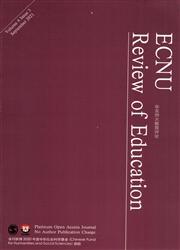无知如何对教师有用?
IF 2.7
Q1 EDUCATION & EDUCATIONAL RESEARCH
引用次数: 0
摘要
亮点教师可以利用无知来提高自己的作用,促进学习过程。战略上的无知可以用来加强公正性,避免分散自己的注意力。假装的无知可以用来加强独立学习技能,避免对简单问题的高度依赖。教师对无知的承认可以用来促进谦逊、好奇心和心理安全的环境。本文章由计算机程序翻译,如有差异,请以英文原文为准。
How Can Ignorance Be Useful to Teachers?
Highlights Teachers can use ignorance to improve their role and facilitate the learning process. Strategic ignorance can be used to strengthen impartiality and avoid spreading oneself thinly. Feigned ignorance can be used to reinforce independent learning skills and avoid high dependence on simple questions. Teachers’ admission to ignorance can be used to promote humility, curiosity, and psychologically safe environments.
求助全文
通过发布文献求助,成功后即可免费获取论文全文。
去求助
来源期刊

ECNU Review of Education
Social Sciences-Education
CiteScore
4.90
自引率
0.00%
发文量
41
审稿时长
10 weeks
 求助内容:
求助内容: 应助结果提醒方式:
应助结果提醒方式:


